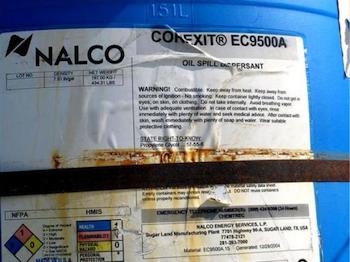After years of ignoring the dangers of the oil dispersant Corexit, the Environmental Protection Agency has finally decided to enact stricter standards for how dispersants are used during offshore oil spills… Sort of.
According to Truth-Out reporter Dahr Jamail, the EPA has proposed a slew of new standards that would better govern the use of dispersants for future spills. But, as Jamail points out, American doctors and scientists are concerned that the agency is not doing enough to protect the public and the environment from the dangers of the dispersants:
Robert Mathis, an M.D. and doctor of environmental medicine in Santa Barbara, California, described how several of the chemical ingredients of the dispersants that are regularly used on oil spills remain unknown because they are “trade secrets,” but that even the known chemicals in the dispersant cocktails are extremely dangerous to humans; they contain an “emulsifier that allows chemicals deeper penetration into tissues and cells.”
“Dispersants disrupt both bacterial and human cell membranes,” Mathis explained. “Damage disrupts cell functions, leading to cell failure, and may cause cancers and death. All living things are damaged, including groundwater.”
The new guidelines proposed by the agency would give the public broader access to the rules that govern the use of dispersants, the available dispersants for the type of spill, and the risks of using each particular dispersant, sometimes including a list of ingredients.
The EPA’s decision to begin regulating the use of dispersants comes years after the agency knew of the dangers from Corexit.
In fact, as I reported several years ago, the agency didn’t even want to use the chemicals to clean up the BP spill, and even went as far as to tell BP that they could not use them. However, BP insisted, and the EPA backed down.
At the time, there were at least 12 other dispersants that were both less toxic and more effective than Corexit.
So why did BP insist on using the highly toxic Corexit? Because they had a financial stake in its use:
…the choice to use Corexit instead of more effective, less toxic competitors could easily stem from the fact that the company that produced Corexit, Nalco, was formerly owned by Exxon and the leadership for the company includes executives from both Exxon and BP.
While the exact chemical compounds used in oil dispersants are currently an “industry secret”, it is known that no fewer than 5 of the ingredients are known to cause cancer. However, the EPA’s new guidelines will make the ingredients available to the public, but that is of little comfort when the agency refuses to ban their use.
The cleanup crews that worked during the 2010 Deepwater Horizon oil disaster have already experienced serious adverse health effects from their exposure to Corexit. Again, from Jamail:
A 2013 study in the American Journal of Medicine sheds more light on the potential health repercussions for the more than 170,000 people who worked in some capacity to clean up the 2010 disaster.
The study shows that people hired to clean up Gulf of Mexico beaches and marshes during the 2010 oil spill have significantly altered blood profiles that, just as (Dr. Susan) Shaw and other toxicologists warned, put them at increased risk of developing liver cancer, leukemia and other disorders.
To date, no long-term studies have been done on the health effects of oil dispersants on humans. Given the harsh realities we’re already seeing from the short-term health effects, it ought to behoove EPA to study this before there aren’t many living specimens to test for long-term exposure effects.
Subscribe to our newsletter
Stay up to date with DeSmog news and alerts






